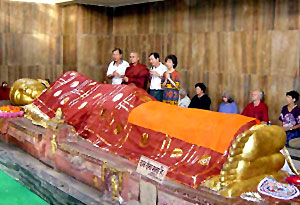Parinirvana, in Buddhism, is the final stage of nirvana. Generally it is believed that one can only attain this stage after death. But Parinirvana descends only upon those who had attained complete awakening or `bodhi.` It is the final stage in Buddhism and it completely liberates one sansara, bhavachakra, karma and rebirth. At this stage all the mental and physical sufferings or skandhas dissipate. This leads to the attainment of salvation. The Parinirvana of Buddha is described in the Pali canon or the Mahaparinibbana Sutta.
 The term Mahaparinirvana means "great, complete Nirvana." This mainly refers to the final stage of nirvana achieved by an Enlightened One or Buddha or even by an Arhant. At the moment of physical death when the worldly sufferings are being discarded only the Buddhist skandhas remain. This is a common belief with Mahayana Buddhism. However it may also refer to Buddha`s inner spiritual state. This school of Buddhism believes that Buddha preached about Parinirvana in the same way in which he preached nirvana.
The term Mahaparinirvana means "great, complete Nirvana." This mainly refers to the final stage of nirvana achieved by an Enlightened One or Buddha or even by an Arhant. At the moment of physical death when the worldly sufferings are being discarded only the Buddhist skandhas remain. This is a common belief with Mahayana Buddhism. However it may also refer to Buddha`s inner spiritual state. This school of Buddhism believes that Buddha preached about Parinirvana in the same way in which he preached nirvana.
This is the stage in which an Arhant can achieve "the Eternal, Bliss, the Self, and the Pure." The parallel to Parinirvana can also be found in Hinduism. In this religious canon it is known as `mahasamadhi.`












